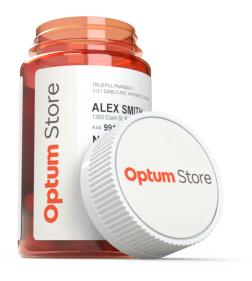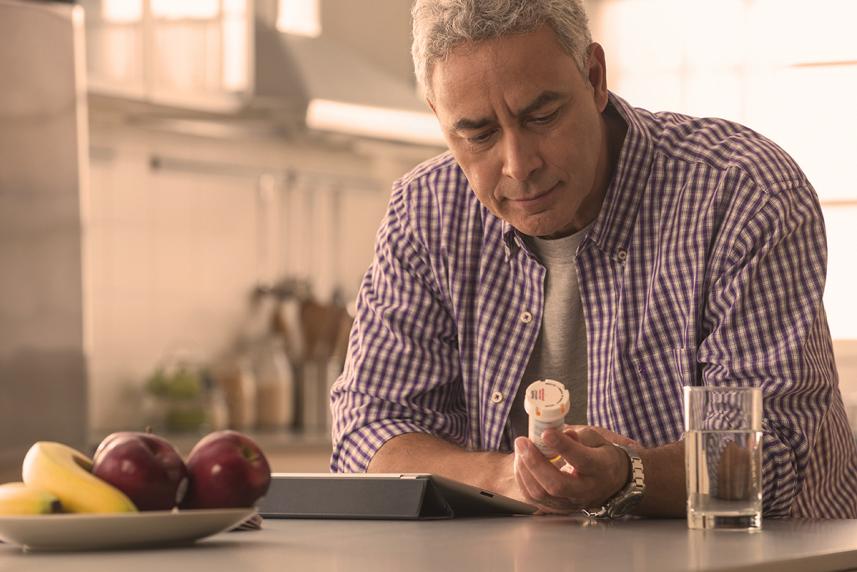
With prescriptions as low as $3 per month, you might be surprised at what you can save with the Optum Store.

That date on the package is there for a reason. Keep yourself and your family safe with these expert tips on when and how to dispose of old medications.
It’s happened to all of us: You come down with a stuffy nose and reach into the medicine cabinet only to find that your cold medication expired over a year ago. You wonder, “Should I still take it? Is it even safe?”
These are questions everyone asks about over-the-counter (OTC) and prescription medications at one time or another. We turned to the experts to get answers.
That date stamped on the medication package isn’t the same as an expiration date on a gallon of milk. It simply tells you the date at which the manufacturer can still guarantee the full potency and safety of the medication, according to Harvard Medical School’s Harvard Health Publishing.
The chemicals in any medication can degrade over time. The expiration date indicates when the medication might not be potent enough to do its job.
Still, that medication may actually have a much longer shelf life. In fact, research by the U.S. Food and Drug Administration (FDA) found that 90% of more than 100 prescription and OTC medications were perfectly fine to take even 15 years after the expiration date.
So you may be able to use medications after their expiration date. But that doesn’t mean you should.
For example, medications that treat heart disease lose their therapeutic effects faster than other types of medications, according to Sampson Asumadu. He’s a pharmacist at Adcare Hospital of Worcester, an American Addiction Centers treatment facility in Massachusetts.
If you take the medication past the expiration date, it may not reach the blood levels needed to control or treat heart disease. This means your prescription medication may not be protecting your heart the way you expected.
Expired antibiotics can also be problematic. They may fail to treat infections if they’ve lost their potency. The result: You run the risk of developing a more serious illness along with antibiotic resistance, according to the FDA.
And some expired medications can get contaminated with bacteria. Others become dangerous due to a change in chemical composition.
Even adhesive bandages (such as Band-Aid®) and topical ointments can expire. Bandages lose their elasticity and may not perform well over time if they’ve been infused with antibiotics, Asumadu says. And ointments contain chemicals that degrade and lose their effectiveness just as capsules and pills do.
If your medication has expired, stay on the safe side and get a new batch.
You buy everything else online. Why not your medication? Start here.
Add your medicine chest to your spring cleaning checklist. “It’s a good practice to clean out your medicine cabinet every year and throw away any unused medications,” Asumadu says.
First, take everything off the shelves. Then check for expired OTC medications and leftover prescription medications you no longer take.
If you have kids, it’s especially important to stay on top of what’s in your medicine chest. Young children might accidentally ingest medications. You may also be worried that curious tweens and teens in your household could misuse medications.
Keep a close eye on medications that are easy to abuse, such as painkillers (opiates), anti-anxiety medications (benzodiazepines) and sleeping pills (sedatives or tranquilizers), Asumadu says. Expired cough medicines and prescription stimulants should also be tossed ASAP.
You should also dispose of any pills that are crumbly or ointments that are dried up.
To safely dispose of expired medications, first be sure to cross out any personal information (name, address, Rx number) on the bottle or package. Then check for drug takeback sites in your area.
Some businesses are authorized by the U.S. Drug Enforcement Agency (DEA) to collect and dispose of unused or expired medications. These collection sites may include:
They may offer on-site drop-off boxes, mail-back programs or an in-home solution. To find a site near you, call 800-882-9539.
In addition, the DEA regularly sets up national prescription drug takeback events in communities across the country.
If you can’t find a drug takeback site in your area, you can safely get rid of your expired medications at home.
A good method is to mix any unused medication in coffee grounds, Asumadu says.
Simply take the medications out of their original containers, pour them into a sealable bag, and fill the bag the rest of the way with coffee grounds. Then put the sealed bag in the trash. Be sure to conceal or remove any personal information from the empty medication containers before you toss them in recycling or the trash.
In general, it’s not a good idea to flush medications down the toilet. They may seep into groundwater or pass through water treatment systems and end up in rivers and lakes, says the U.S. Environmental Protection Agency.
But there are times when flushing medications may be your best move, according to the FDA. If you can’t find a medication takeback program, you can flush medications that are commonly abused or can be fatal if taken incorrectly.
The goal is to keep everyone in your home safe by ensuring that these medications can’t be misused. Check the FDA’s flush list to see which medications fall under this category.
Don’t leave any medications lying around, expired or otherwise.
Storing prescription and OTC medications the right way can keep them working longer and also prevents others in your household from dipping into them.
“It’s always a good practice to store medications in a cabinet that can be locked and kept away from heat and moisture,” Asumadu says. But some medications may need to be refrigerated. When in doubt, check the medication label or care instructions.
Talk to your local pharmacist if you still have questions about safely storing or disposing of medications.

With prescriptions as low as $3 per month, you might be surprised at what you can save with the Optum Store.
Additional sources
Expiration dates: Harvard Health (2022). “Drug Expiration Dates—Do They Mean Anything?”
Risks of expired medications: FDA (2021). “Don’t Be Tempted to Use Expired Medicines”
EPA statistic: EPA (2016). “Don’t Flush! Why Your Drug Disposal Method Matters”
FDA flush list: FDA (2020). “Drug Disposal: FDA’s Flush List for Certain Medications”
Storing medication: Cleveland Clinic (2020). “How to Store, Travel with, and Afford Your Medications”